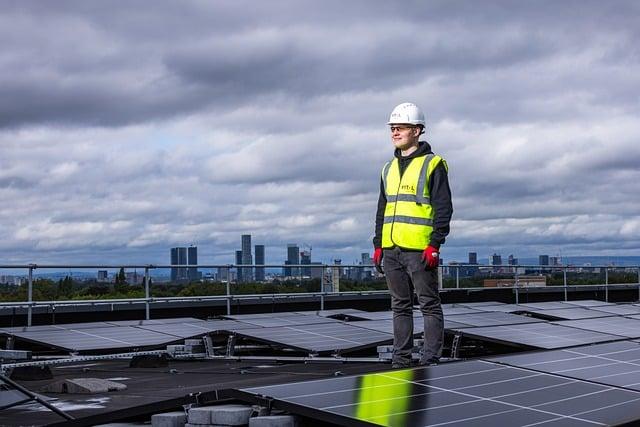In a world increasingly driven by the pursuit of sustainable energy solutions, the intersection of solar power and electric vehicle (EV) technology represents a harmonious blend of innovation and necessity. As the sun casts its abundant rays upon our planet, it not only illuminates our days but also fuels a transformative shift in how we power our journeys. This article delves into the burgeoning relationship between solar energy and EV charging, exploring how this dynamic duo is not only revolutionizing the way we think about transportation but also paving the way for a cleaner, greener future. With each solar panel installed and every EV charged, we edge closer to a world where renewable energy is the norm, and the roads are humming with the quiet promise of progress. Join us as we journey into the realm where the sun meets the road, and discover how solar energy is lighting the path forward for electric vehicles.
Harnessing the Sun to Revolutionize Electric Vehicle Infrastructure
In the quest for a sustainable future, solar energy emerges as a beacon of hope, particularly in its application to electric vehicle (EV) charging infrastructure. The marriage of photovoltaic technology and EV systems is a game-changer, transforming how we power our journeys and reducing our carbon footprint. Solar-powered EV charging stations are sprouting up in urban landscapes, offering a glimpse into a future where energy is both renewable and readily available. These stations, often equipped with advanced battery storage systems, ensure that energy harnessed during sunny days is efficiently stored for use during peak charging times or overcast days. This not only optimizes the use of solar energy but also alleviates pressure on traditional power grids.
Key advantages of integrating solar energy into EV charging infrastructure include:
- Reduced Dependency on Fossil Fuels: By utilizing solar power, we can significantly cut down the reliance on non-renewable energy sources.
- Cost Efficiency: Although initial setup costs can be high, the long-term savings from reduced electricity bills and maintenance costs make it a financially viable option.
- Scalability: Solar-powered charging stations can be deployed in various locations, from urban centers to remote areas, making EVs more accessible.
- Environmental Impact: These stations help in lowering the overall greenhouse gas emissions, contributing to a healthier planet.
As technological innovations continue to advance, the synergy between solar energy and electric vehicles promises to drive us toward a cleaner, more sustainable future.
Innovative Solar Technologies Transforming Charging Efficiency
The quest for sustainable energy solutions has paved the way for remarkable advancements in solar technology, significantly enhancing the efficiency of electric vehicle (EV) charging systems. These innovations are not only increasing the speed and accessibility of charging but are also making it more eco-friendly. Among the groundbreaking technologies, solar canopies have emerged as a game-changer, transforming parking lots and other urban spaces into renewable energy hubs. These structures capture solar energy during the day, storing it for use when demand peaks, thus ensuring a steady supply of green power.
- Integrated Photovoltaics: These are being seamlessly embedded into building materials, allowing EV charging stations to be powered directly by solar panels incorporated into roofs or facades.
- Wireless Charging Pads: Coupled with solar energy, these pads offer a convenient and efficient way to charge EVs without the need for cables, harnessing sunlight to power vehicles effortlessly.
- Smart Grid Connectivity: This technology ensures optimal energy distribution by dynamically adjusting the flow of solar power based on real-time demand and supply metrics.
With such cutting-edge developments, the integration of solar energy into EV charging infrastructure is not only a step towards reducing carbon footprints but also a stride towards a future where renewable energy seamlessly powers our everyday journeys.

Strategic Integration of Solar Power in Urban EV Charging Networks
Urban environments are witnessing a transformative shift as solar power is strategically integrated into electric vehicle (EV) charging networks. This integration not only harnesses the abundant solar energy available but also addresses the growing demand for sustainable and efficient EV infrastructure. By utilizing solar canopies over parking lots and rooftop solar panels on charging stations, cities are reducing their reliance on the grid, minimizing carbon footprints, and cutting down on energy costs. This approach is particularly beneficial in areas with high solar irradiance, where the potential for clean energy generation is significant.
The implementation of solar power in urban EV charging networks brings a multitude of advantages:
- Energy Independence: By generating their own power, charging stations can operate independently from the traditional power grid, providing a reliable source of energy even during peak demand times.
- Cost Savings: Utilizing solar energy reduces operational costs for charging networks, making EV charging more affordable for consumers.
- Environmental Impact: Solar-powered charging stations significantly lower greenhouse gas emissions, contributing to a cleaner urban atmosphere.
- Scalability: As the demand for EVs increases, solar-powered charging networks can be expanded without the need for extensive infrastructure changes.

Maximizing Sustainability with Solar-Powered Charging Solutions
As the world increasingly shifts towards renewable energy, solar-powered charging solutions are emerging as a pivotal component in the evolution of electric vehicle (EV) infrastructure. By harnessing the sun’s energy, these systems offer a clean and efficient alternative to traditional charging methods. This not only helps reduce the carbon footprint associated with EV charging but also contributes to the broader goal of energy independence. Solar-powered charging stations can be strategically deployed in remote locations, making EV charging more accessible and convenient for all.
Key advantages of integrating solar energy into EV charging include:
- Reduction in energy costs: Utilizing solar power minimizes reliance on the grid, leading to lower electricity expenses.
- Environmental impact: By reducing dependency on fossil fuels, solar-powered systems contribute to a decrease in greenhouse gas emissions.
- Scalability: Solar panels can be easily scaled to meet increasing energy demands as EV adoption grows.
- Energy security: With the ability to generate power independently, solar solutions enhance resilience against grid disruptions.
In Summary
As we stand on the brink of a new era in sustainable transportation, the synergy between solar energy and electric vehicle charging is lighting the path forward. This innovative convergence not only promises a reduction in carbon emissions but also heralds a future where clean energy powers every journey. With the sun as an endless source of power, the advancements in EV charging are no longer a distant dream but a burgeoning reality. As technology continues to evolve, the seamless integration of solar energy into our daily commutes will drive us toward a greener tomorrow. In this dance of photons and electrons, the horizon is not just bright—it’s sustainable.


































